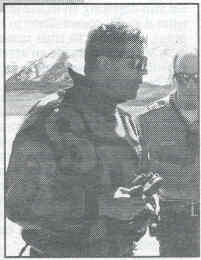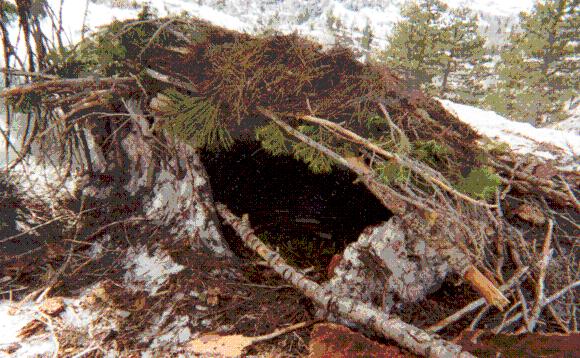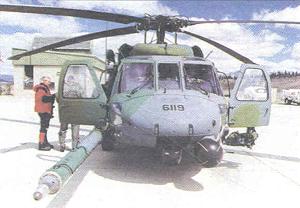A San Diego man inadvertently skied out of bounds from Mammoth Mountain, and spent two nights in a improvised shelter before he was located by a helicopter search team.

Embarrassed and apologizing profusely to his rescuers, Richard Levak is one of about 14 skiers and snowboarders who are rescued every year after skiing off the backside of Mammoth Mountain. He was alive, as are most of the people who end up down in the San Joaquin River drainage. But in Levak's case, he skied further into the wilderness than searchers had expected, and it took two days of extensive searching to locate him. He was found one-quarter mile south and one-quarter mile east of Lower Rainbow Falls in the Fish Creek drainage.
Fifty-year-old Levak spent two nights out in temperatures between 20 and 30 degrees, dressed only in ski pants, ski boots, and a sweater.
An extensive search took place for Levak, who is an expert skier. The search team included three helicopters, five search dog teams, 40 ski patrollers, Mono County Sheriff Department Search and Rescue team members, snowmobiles, Snowcats, and Mammoth Lakes Police Department officers.
Since his rescue April 10, Levak, who is a psychologist, has spent a great deal of time thinking about his backcountry ordeal.
"I made the mistake of having been working hard -- a tremendous amount of complicated work. I wanted to be free and fly through the snow."
He arrived in Mammoth around midnight, Friday, April 7, with a friend also from Del Mar, Mark Hill. They headed out onto the slopes early the next morning to go skiing. Levak skied a few runs with Hill, who was not an experienced skier.
"I was feeling hemmed in, dying to ski," Levak recalled. They arranged to meet for lunch at Mid Chalet at 11:30 a.m. That was the last Hill saw of Levak.
About 10:30 a.m. Levak rode up the Panorama Gondola with ski patrolman Lee Freese. They discussed ski runs, as Levak was not familiar with Mammoth Mountain. Freese suggested he should ski Dave's Run or Chair 9. Levak skied off towards Dave's Run. He found a break in the bamboo poles on the way to Dave's Run. He thought this was the entrance to Dave's Run, and began skiing southwest down the backside of the Mountain, the opposite direction to Dave's Run.
Lost
"The slope is very icy -- a sheet of ice," Levak remembers. "I'm very careful, concentrating on getting down. I see a boundary line on the left and follow it down. Soon I see trees, and go through the trees. I assume the run is going to end up coming out on a trail. Everyone tells me Mammoth is huge.
"No one is on it. I ski for quite a while. I can ski a long time without getting tired. The terrain changes, and I end up in a small basin. I take off my skis and climb out. I think to myself, this is very odd."
Levak becomes concerned, but believes he will eventually come to a road and be able to hitchhike back to the Ski Area. But each turn he now makes takes him further into the wilderness.
He soon realizes he is very lost. Mammoth Mountain is nowhere in sight. It will be evening before his friend Mark Hill reports him missing.
By now it is early afternoon, and he doesn't think he can hike back up to the top of the Mountain before nightfall. (Levak had skied down 4.5 miles from the top of the gondola.) He decides to stay where he is, and build a shelter.

Using dead trees, branches, and snow Del Mar resident Richard Levak found a rock
with two trees in front and used the snow around the rock to build a "long coffin-shaped shelter."
"I find a rock with two trees in front. I use the snow around the rock to build a long coffin-shaped shelter." Using dead trees, branches, and snow, Levak forms the roof to his shelter.
That morning he had eaten a light breakfast of oatmeal and fruit. He has no matches, no food, and is wearing only a thermal undershirt, a sweater, and ski pants with no long-johns.
"It is starting to get cold and dusky. It soon gets dark, and I crawl into my shelter. I had packed snow on top of the branches, which leak and is unpleasant."
Levak has a cold, restless night
"I start to fall asleep for two or three minutes, then wake up shivering to the bone. I crawl out of my hole and kick in between two trees -- flap my arms and eat snow. Then get back inside my shelter. Each time I force myself to eat snow, even though I don't want to -- it makes me feel cold." Levak is eating snow to keep his body hydrated.
"I get up in the morning and I am so pleased I'd made it. I can't figure whether I should walk back or stay put. I feel good, but I am scared about what to do.
"I have no idea whether they will look for me or not, or what to expect."
The Search
Meanwhile, the Mono County Search and Rescue team had spent the night searching for Levak. The ski patrol had checked all the runs, and no clues were found. Levak's room at Mammoth Mountain Inn was searched, and his wife Linda contacted. She came to Mammoth, and was interviewed by MLPD, along with Hill.
On Sunday morning a CHP helicopter was searching the area. It flew over Levak.
"I waved. They did what seemed to be a very perfunctory look and left. I was very disheartened. I thought maybe that's all they do. I did not know what the deal was. There was no noise. No people."
By now it was noon on Sunday. Levak debated with himself about what he should do.
"I was scared to go back up." He decided to spend another night in his shelter. He spent time making improvements to it, adding layers of pine needles to the roof.
During the afternoon an army helicopter flew over several times.
"It was very close above me -- 200 to 300 feet. I was sure they'd seen me. I found myself weeping. A four-prop plane passed over twice. I wept for joy. I felt they must have seen me.
"When they left I felt so disheartened. I thought maybe after two nights they'd quit."
He climbed to a dome facing west, high above his shelter. From here he prepared to wave down a helicopter. None flew by while he was there. Stumbling around in his ski boots, crossing a creek and fallen logs, he was afraid he might break a leg.
Near sunset he collected bark and formed a circle about 15 feet in diameter, in the middle of an open area. He hoped it would be spotted by searchers.
The second night in the shelter was even colder. The wind was blowing. "I tried to make a door. It was so cold. My head would get so cold. I would jump up and down, run around, and eat snow.
"That night I began to think maybe I'd die. The clouds were moving quickly across the sky. The clouds were looking very ghoulish."
He worried about his wife Linda and their 9-year-old daughter Rachel. "I couldn't stand my wife to think I'd gone out of bounds recklessly."
The Rescue
That night Levak was cold, and confused about what he should do. On Monday morning he decided to try and hike out. He crossed a stream and up through a dense wood.
"I kept climbing, and climbing. I turned and went back. I was going in circles. I was now scared. I was losing energy." He came across a burnt-out area of forest he did not recognize. Becoming concerned, he retraced his steps back to his shelter.
"Helicopters flew by and I tried to flag them down. I lost heart.

"At 2 or 2:30 p.m. a helicopter saw my circle. It got closer and closer. I was so afraid they would leave me. They threw me a bottle of water.
SAR member Dave Harvey was on board the Air Force helicopter from Moffett Field. It is very difficult to spot a person from a helicopter in a forest of trees and shadows.
"He didn't realize the magnitude of the outdoors," Harvey said. "The circle was small. The angle of view from the helicopter made it hard to see. You become a 6-foot shadow in a forest of 80-foot tall trees and rocks."
Harvey spotted the circle Levak had made. The helicopter had to return to base to lighten its load before it could lower a crewman down and winch Levak on board.
An extremely happy Levak was winched on board and taken to Mammoth Airport. From there he was taken by paramedics to Mammoth Hospital for a checkup.
"He was very fit and very strong," said Jim Gilbreath, one of the operations leaders for search and rescue.
At this time Linda Levak had traveled back home to Del Mar to tell their daughter that Richard was lost. About half an hour after Linda had told Rachel that her dad was missing, searchers located him. Gilbreath called Linda on her mobile phone. Screams of joy echoed through the airwaves from both Linda and Rachel. A welcome reward for a hardworking operations leader.
Looking back on his ordeal, Levak admonishes himself. "I was so ashamed of myself," Levak said. "They were wonderful people, extremely kind and caring. I am sorry I caused trouble. How utterly grateful I am. People risked their lives to save me."
To show his appreciation, Richard Levak has sent a $1,000 check to Mono County SAR.
Now back home in Del Mar, Levak has decided to volunteer his services to the community. He is helping out at a free medical clinic at Solana Beach. MT